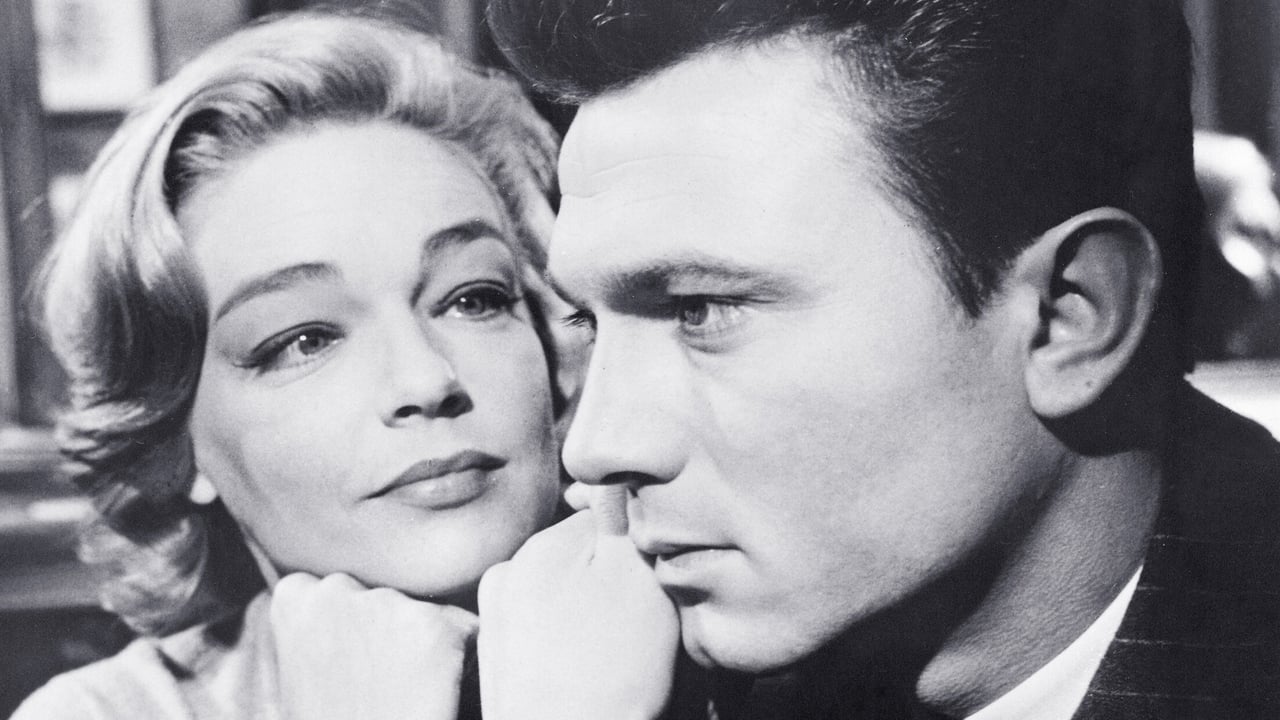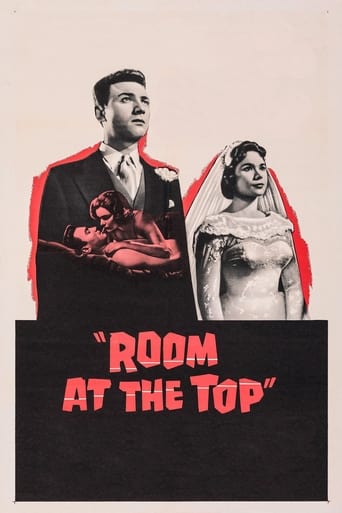

Tied for the best movie I have ever seen
... View MoreSuch a frustrating disappointment
... View MoreYes, absolutely, there is fun to be had, as well as many, many things to go boom, all amid an atmospheric urban jungle.
... View MoreTrue to its essence, the characters remain on the same line and manage to entertain the viewer, each highlighting their own distinctive qualities or touches.
... View MoreA powerful performance by Laurence Harvey highlights this drama about a young man determined to be successful. Joe Lampton leaves the lower class industrial town of his youth with his sights set on achieving success on his own terms. His thin veneer of braggadocio hides layers of insecurity about his class and blue-collar pedigree.He determination to wed a naïve girl (Heather Sears)from money is sidetracked by his relationship with an older woman (Simone Signoret). Will his cold calculations determine his future or will he learn that life is about more than status and money?The strength of Harvey's portrayal borders on scenery chewing, but it is eminently watchable. Fortunately, Sears and Signoret are strong enough to balance his flamboyance, with the aid of Donald Wolfit who plays the father of the would-be bride with an understated power.Filmed in black and white, "Room at the Top" deserves its six Oscar nominations (and two wins). How much viewers enjoy it depends heavily upon their appreciation for Harvey's character, Joe Lampton.
... View MoreIn 1956, John Osborne wrote his play "Look Back in Anger," which was a turning point in British drama in examining class revolt and changing social conditions in England in the post war years. But while Osborne's play is now virtually forgotten as a "kitchen sink" period piece, "Room at the Top," which examines similar issues in the film medium, has stood the test of time.Laurence Harvey stars as the social climber from humble origins, a role that is the reincarnation of Osborne's "angry young man" Jimmy Porter in "Look Back in Anger." Porter succeeds in marrying a woman above his social rank, then abuses her. But as portrayed by Harvey, the character of Joe Lampton is much more complex, as his driving ambition to win the hand of the daughter of an influential industrialist is balanced by his soulful connection to an older married woman. The self-loathing of Lampton is apparent throughout, as he constantly humiliated by his social superiors. Possibly the worst abuse comes from his future mother-in-law, who is dripping in contempt for what she perceives as a commoner. In the process, Joe becomes nearly as tortured as Raymond Shaw, the protagonist of "The Manchurian Candidate," for which Laurence Harvey will always be remembered.In the portrayal of the younger woman named Susan, Heather Sears is outstanding for her naivety and cheerful optimism in the attraction she feels for Joe Lampton. But it is in the interpretation of the older woman, Alice Aisgill, that the film will always be remembered for the transcendent performance of Simone Signoret.Signoret's portrayal of Alice as the vulnerable French expatriate in a loveless marriage to a British highbrow is almost a mirror image of the social misfit Lampton. The characters bond in their common ground as outsiders in the claustrophobic British class system in the fictional town of Warnley. In virtually all of her scenes, Signoret is magnetic in her sensitivity, as especially apparent in her eyes.Every viewer will have his or her favorite scene in this film. For me, it is moment in the cottage where Joe and Alice have escaped to an idyllic seaside retreat where they rush into the house out of the rain. Joe offers Alice a cigarette, but she refuses. She tells him that she wishes to abstain for smoking and drinking during their holiday for she wants each of their moments together to remain "clear and sharp" in her memory. This unforgettable moment could only be realized by a performer of Signoret's abilities.Led by Signoret, Harvey, and a stellar cast of British actors, this old-style black-and-white film with the rapid-fire pacing and wrenching emotional ending rises to the top as one of the great cinematic experiences of the second half of the twentieth century.
... View MoreJack Clayton's brilliant, cynical 1959 movie of John Braine's novel "Room at the Top" (1957) can now be seen in a complete High Definition print on YouTube. I hope this easy availability brings it to the attention of a new generation of not just film fans but those interested in Britain's social history in the Post War years. Braine was at the centre of the "Angry Young Men" literary movement of the 1950s (although in reality there was no "movement" as such - just a coincidence of good writing by young writers troubled by the social mores of the times). Set in a northern town, and with a symbolic background of chimneys and the daily grind, "Room at the Top" is about aspiration and ambition - about how a determined, clever, handsome young man, Joe Lampton (Laurence Harvey) finds room at the top for himself artfully and by trampling over a few hearts along the way. New to the town of Warley - a step up from his more downmarket home town - Joe declares early his intention to succeed. His job as an accountant in the local authority offices is to be no more than a stepping stone to better things.Notwithstanding the political revolution of the Labour government of 1945-1951 Britain's establishment regrouped and reinforced its barriers to entry. Kingsley Amis in "Lucky Jim" (1954), Stan Barstow in "A Kind of Loving" (1960), Alan Sillitoe in "Saturday Night and Sunday Morning" (1958) as well as Braine and others describe these barriers and the difficulties of breaking them down. In "Room at the Top" class and privilege are the key. With his brashness and brains Lampton is clearly a man on the make. Warley's big cheese is Abe Brown (Donald Wolfit) millionaire, factory owner, stalwart of the Conservative Club. A man used to getting his own way. Brown has a pretty daughter in her late teens, virginal and with a cut glass accent to contrast with her father's self-made-man Yorkshire. Susan Brown (Heather Sears) falls for Joe and he sees not just the challenge (easily overcome) of breaking down her barriers but also her potential usefulness to him in his determined climbing of the ladder. Whilst decorative and useful Susan Brown inspires no passion in Joe - but he also meets Alice Aisgill (Simone Signoret), older, beautiful, physically stunning, married, unhappy. Susan is prettily naive but Alice is worldly and desirable. Lampton's seduction of Susan is carried out clinically and dispassionately. His affair with Alice is the real thing - for both of them. When it becomes known to Alice's husband George (Alan Cuthbertson) the latter threatens Joe with financial and social ruin unless he breaks it off. This is a pivotal scene symbolising the "Them and Us" world of that time and place. Another symbol of the class divide is the portrayal by John Westbrook of Sarah's boyfriend Jack Wales. Wales, like Lampton, was in the RAF during the war and also like Lampton was a Prisoner of War. But where Joe was a humble Sergeant Wales was an Officer and a heroic escaper from captivity. Wales demeans Joe by calling him "Sergeant" - a gratuitous bit of class snobbery that makes Lampton all the more determined to succeed!When Joe Lampton gets Susan Brown "In the family way" the story approaches its climax. In a cameo of exceptional quality Donald Wolfit's Brown tests Joe's intentions over Game soup at the Conservative Club. "My father would be horrified to see me here" says Joe. "So would mine" says Brown suggesting that he has more in common with his daughter's seducer than might be thought. He offers Joe an incentive to break up with Susan which Joe flatly refuses. That was the test. The real offer is a job at Brown's and a ticket on the gravy train if he marries Susan. Joe accepts.Alice is to be abandoned - a casualty of Joe Lampton's ambition and choice of fortune over love. Alice goes alone to the pub, drinks herself into a near stupor, drives away in her car and kills herself. A distraught Joe wanders alone through the Warley streets, lands up in a pub himself where he toys with a pretty empty-headed girl who briefly deserts her boyfriend for him. In another strongly symbolic moment the boyfriend turns on Joe and tells him not to think that his (Joe's) class gives him any rights. Joe is now the middle-class man he aspired to be - at least in the eyes of this stranger. Joe wanders away and is set upon by the boyfriend who was waiting for him with a gang. Joe gets beaten to a pulp for his temerity in having chatted up the girl, and for his seeming assumption that he had an entitlement to do so."Room at the Top" ends with Joe and Susan's wedding - it's the full monty with church and bridesmaids and the rest. Joe has arrived - and his beautiful bride is beside herself with perky happiness as they are driven away in the wedding car after the ceremony. But Joe is unsmiling. He has won, but in winning he has lost not just his one true love but some of himself. "Was that really all really worth it ?" you know he must be thinking?
... View MoreOh how I enjoyed this film, that's what it was, a film, not just a movie. I can't believe it took me so long to watch, silly me had it on my DVR since March/05/2012 and never felt like watching it. I just finished it now.The acting from the leads was superb! I loved Alice and Joe. The acting from so many of the actors was top-notch, only the character Susan was a bit of a drag. How I hate that Joe would be stuck with her whiny and silly self. He did realize that what he thought he wanted wasn't what he wanted at all, and look how he messed everything up. Poor dear Alice! I was hoping all would end well, but I knew it would not. I just knew it. Joe is going to be wealthy and have a life that his friends would never have, but he truly learned that his love for Alice meant more than anything to him. Can you imagine having to listen to Susan for years to come?
... View More